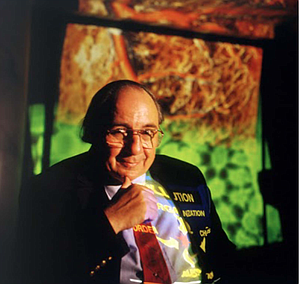11/13/2017

I have written that who you are is shaped by your life’s experiences, and those experiences help to shape how you approach problems and ultimately the solutions you implement. However, all of this is shaped by remembering who you are and those life experiences. Donald J. Coffey was such a person. We both shared similar barriers and managed to overcome such.
As I was thinking about Don, it was amazing how many things we shared in common with those individuals who helped shape my career. All of them were comfortable in who they were. All had faced some adversity in their lives and all had overcome those adversities. But he greatest attribute was that they never forgot where they came from and the impact such could have on others and the importance of a helping hand.
In Don’s passing, not only did the Cancer Research community lose a valuable member who was there to set a moral compass, but more importantly the Intercultural Cancer Council (ICC) lost a valuable supporter. Don was there doing the launching of the ICC and played a prominent role in helping to establish the ICC as major player is changing the trajectory of NCI, as well as NIH, in changing the face of cancer. Don also served as an advisor to the launching of the Center for Research on Minority Health at the University of Texas M.D. Anderson Cancer Center and was one of its strongest supporter.
Don spent over fifty years at John Hopkins, starting as a dishwasher and rising over those years to being one of its most famous faculty. What is most important, to those of you who never got the chance to meet Don, was that he never forgot where he came from. That he graduated from a small four year teaching college with barely a passing grade.
For me, it was failing in my first year at LSU. We both did not allow such to stop us.
I first crossed paths with Don in the late eighties, when I was working with the AACR to help launch its first committee to focus on minorities, now Minorities in Cancer Research (MICR). Over the years, Don became a supporter of the Intercultural Cancer Council (ICC) and minority efforts at John Hopkins. I last saw Don when Dr. Jean Ford invited me to John Hopkins to speak on diversity and clinical trials. And there was Don, retired, but there in the audience, still playing a role in getting people to do the right thing. Our conversation was on never giving u not matter what the barriers, whether it was racism or a learning disability.
For those who are not aware, Don made his transition this past Thursday. Don man from a humble background. Today, Don would probably be labeled a special needs kid. Well this special needs kid worked his way from being a dishwasher to being one the most noted individuals in prostate cancer research who never forgot where he came from and the obstacles he had to overcome. But more importantly, he not only remembered, but brought those experiences in a positive manner into how he related to ALL people, especially the underserved. A very rare individual of his stature indeed, a voice in these times that will be missed and hard to replace.
Most will remember Don for his major breakthroughs in Cancer Research, especially with regarding to Prostate Cancer. For me, I will remember Don as the man who achieved, despite his impediments, but more importantly a man who remembered his obstacles and extended his hand out to help you no matter who you were and/or what you looked like.
In response to my note to the ICC board members, the CRMH/DHCHEER Family and the HDEART Health Equity Scholars & Alumni Network, Elin Greenberg, former chair of the ICC Board of Directors summed it up best, “I will always remember him as a brilliant, inventive, compassionate, generous man, who was open, inclusive and caring. What an example he set! His life story should be a movie shown to students far and wide! The inspiration and lesson that if you try hard, you can achieve beyond your wildest dreams, should be available to all children.”
